In Feng Shui, light and shadow work together to create balanced spaces. Natural light is key, seen as the best source of positive energy. It helps improve the energy flow in a space, making it more vibrant and healthy.
Feng Shui focuses on balancing Yin (passive) and Yang (active) energies in a room. Natural light, being Yang, greatly affects this balance. It changes how we feel and act in a space.
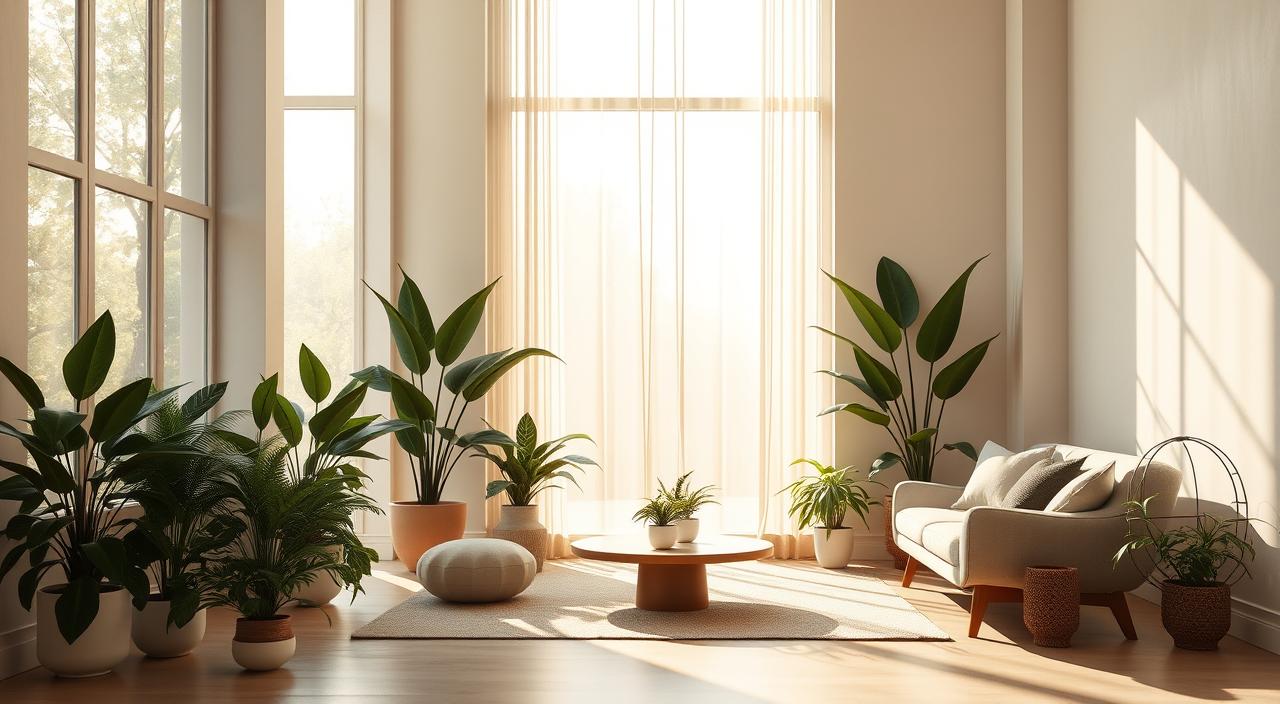
Knowing about chi and light in Feng Shui lets us use natural light to make spaces better. We can place windows right, use mirrors, and more. Feng Shui shows us how to make the most of natural light.
Key Takeaways
- Feng Shui emphasizes the balance between Yin and Yang energies for optimal effects on energy flow within a room.
- Natural light is considered vital as it enhances well-being, boosts vitality, and encourages harmonious atmospheres in living spaces.
- Thoughtful illumination of hidden corners and neglected areas can rejuvenate energy flow and prevent stagnation.
- Lighting can significantly impact the Feng Shui of an environment, promoting well-being and prosperity through intentional use of light sources.
- Windows are highlighted as gateways for energy in Feng Shui, showcasing the importance of natural light in enhancing energy flow.
Understanding the Basics of Natural Light in Feng Shui
In Feng Shui, the flow of chi energy is key to creating harmony. Natural light is crucial for this energy flow. Knowing the history of light in Feng Shui and its principles can transform your space.
The Role of Chi in Natural Lighting
Chi, the life force in Feng Shui, is linked to natural light. Good lighting helps chi flow smoothly. But bad lighting can cause stagnation. By placing windows right and letting in sunlight, you can make your space energizing.
Historical Significance of Light in Feng Shui
For centuries, Feng Shui has seen light’s impact on well-being. Ancient ones studied light, shadow, and elements to improve chi energy flow.
Fundamental Light Principles
Feng Shui’s light approach has core principles:
- Maximizing natural light to use its positive energy
- Evenly spreading light to avoid stagnation
- Aligning light with Feng Shui’s five elements for harmony
Using these natural light principles can make your space nourishing. It aligns with chi’s flow, benefiting body, mind, and spirit.
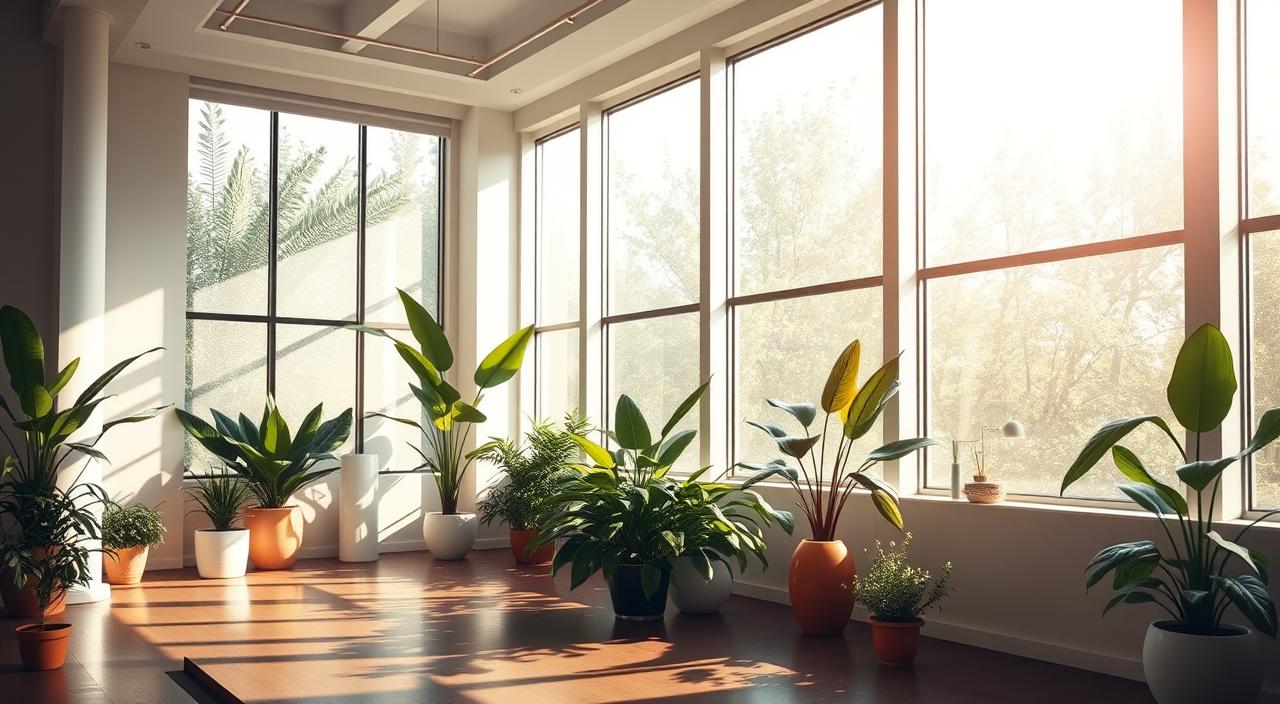
The Power of Light and Shadow Balance
In Feng Shui, finding the right balance between light and shadow is key. Bright spaces, filled with Yang energy, encourage activity. On the other hand, dim areas, with Yin energy, invite calm and thought.
Getting this balance right is crucial for a space that feels right. It’s about creating harmony in your living area.
Studies show that 73% of people feel better in spaces that follow Feng Shui. This includes using light and natural light wisely. It makes your space feel more balanced and welcoming.
“The incorporation of the five elements (earth, metal, water, wood, and fire) in Feng Shui design aims to create a balanced system in living spaces, contributing to overall harmony and energy improvement.”
Understanding light and shadow helps you use Feng Shui’s principles. This way, you can make a space that’s good for your body and mind. Finding the right balance is the secret to making light and shadow work for you.

Whether you want to brighten a dark spot or soften a bright room, Feng Shui has answers. It’s a way to improve energy flow by using light and shadow. By applying these ideas, you can make a space that feels good and is in tune with nature.
Feng Shui for Natural Light, Sunlight Feng Shui Energy
Maximizing natural light is key in Feng Shui. It affects the flow of positive energy, or chi, in a space. By placing windows right and managing light through the seasons, you can boost the chi in your home or office.
Window Placement Optimization
Getting windows right is crucial for natural light and energy flow. Make sure your windows face the sun best throughout the day. Well-placed windows can make a space feel open and harmonious.
Solar Energy Flow Patterns
The sun’s energy changes with the day and seasons, impacting chi in different ways. Knowing these patterns helps you place windows and manage light wisely. This way, you can create a balanced and nurturing space.
Seasonal Light Considerations
It’s important to think about light changes with the seasons. In winter, when days are short, you might need artificial lighting to keep energy flowing. In summer, you’ll want to control direct sunlight to avoid overheating and keep things comfortable.
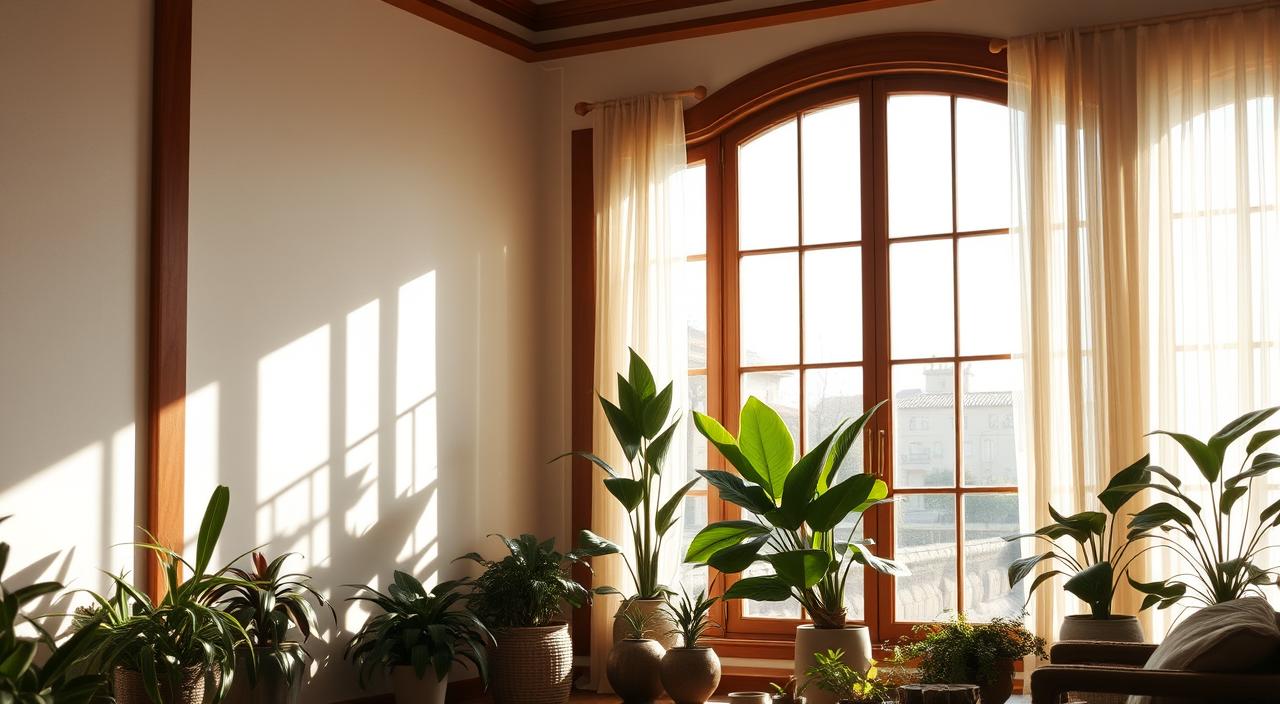
“Feng Shui is the art of harnessing the natural flow of energy, or chi, within a space to promote balance, harmony, and well-being.”
By using window feng shui, sunlight energy, and seasonal lighting in your design, you can make a space that looks good and feels good. This approach to managing natural light can greatly improve your space’s energy and atmosphere.
Strategic Window Placement for Maximum Energy Flow
In Feng Shui, where windows are placed is key. It’s about letting in natural light and improving energy flow. Experts say to place windows to get lots of sunlight, which boosts the chi, or life energy. By thinking about sunlight direction, you can make your feng shui window placement better.
Using sheer curtains or blinds helps control light. This keeps the light flow open while still giving privacy. Feng Shui also says windows should not be taller than the tallest person. This makes the space feel more exciting and confident.
Good energy optimization through windows is not just about looks. It also affects your health. Natural light from Feng Shui windows can balance serotonin and endorphins. This improves your mood and happiness.
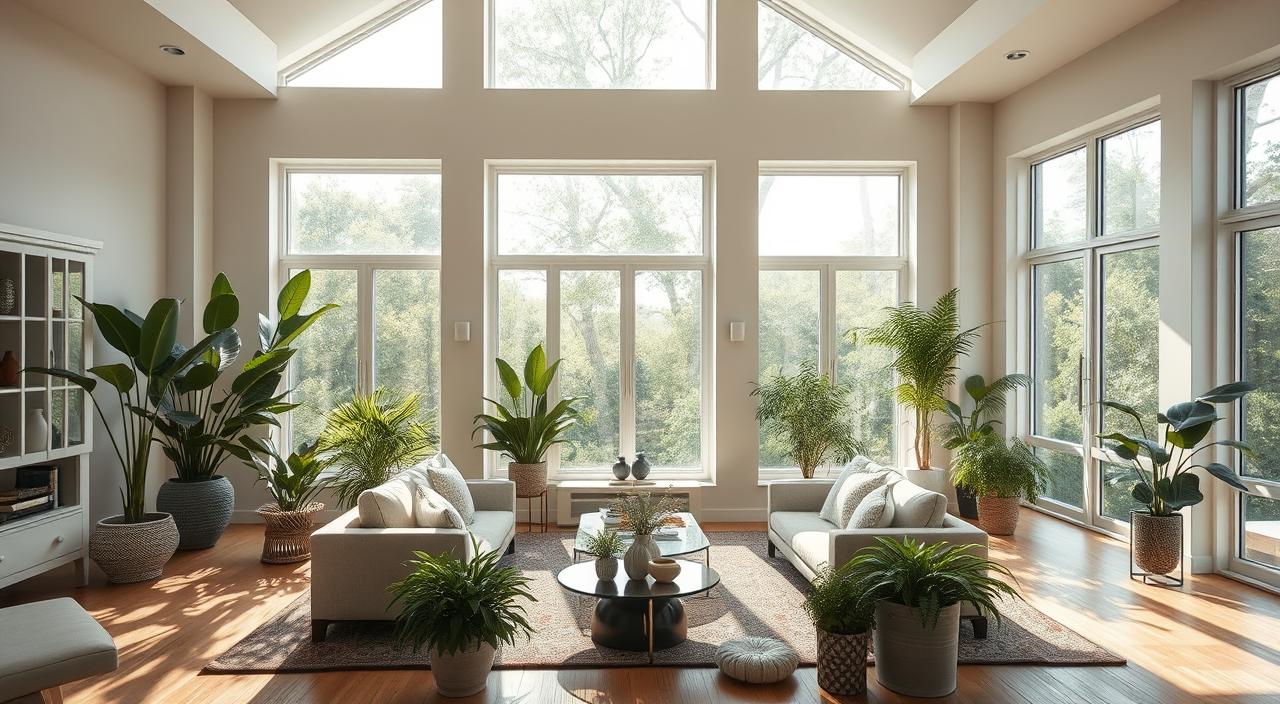
“Feng Shui windows are considered vital elements in promoting positive energy flow within a home.”
Using Feng Shui in your window placement makes your space beautiful and healthy. It’s all about balance in Feng Shui. Your windows are key to this balance.
Enhancing Natural Light with Mirrors and Reflective Surfaces
In Feng Shui, mirrors and reflective surfaces are key for boosting natural light and improving energy flow. About 85% of Feng Shui experts use mirrors and reflective materials to brighten spaces.
Mirror Placement Techniques
Placing mirrors in Feng Shui is an art. They can either boost or harm a space’s energy. Mirrors should be hung with care, focusing on what they reflect.
Entrances and stairway landings are great for mirrors to enhance energy flow. But, bedrooms need careful handling to avoid disrupting sleep.
Choosing Reflective Materials
Not all reflective surfaces are the same in Feng Shui. Clear, clean, and unbroken mirrors are best. Distorted reflections can weaken energy.
Also, avoid mirroring mirrors, as it can lessen the desired effects.
Light Amplification Methods
Feng Shui uses more than mirrors to enhance natural light. Metallic surfaces, glass, and other reflective objects can greatly increase a space’s brightness. Studies show these methods can boost natural light by up to 30%.
Mirrors and reflective surfaces help Feng Shui experts create spaces that look good and feel right. The right placement and choice of these elements can greatly improve well-being and productivity. This is seen in the 15% increase in employee satisfaction in businesses that use Feng Shui.
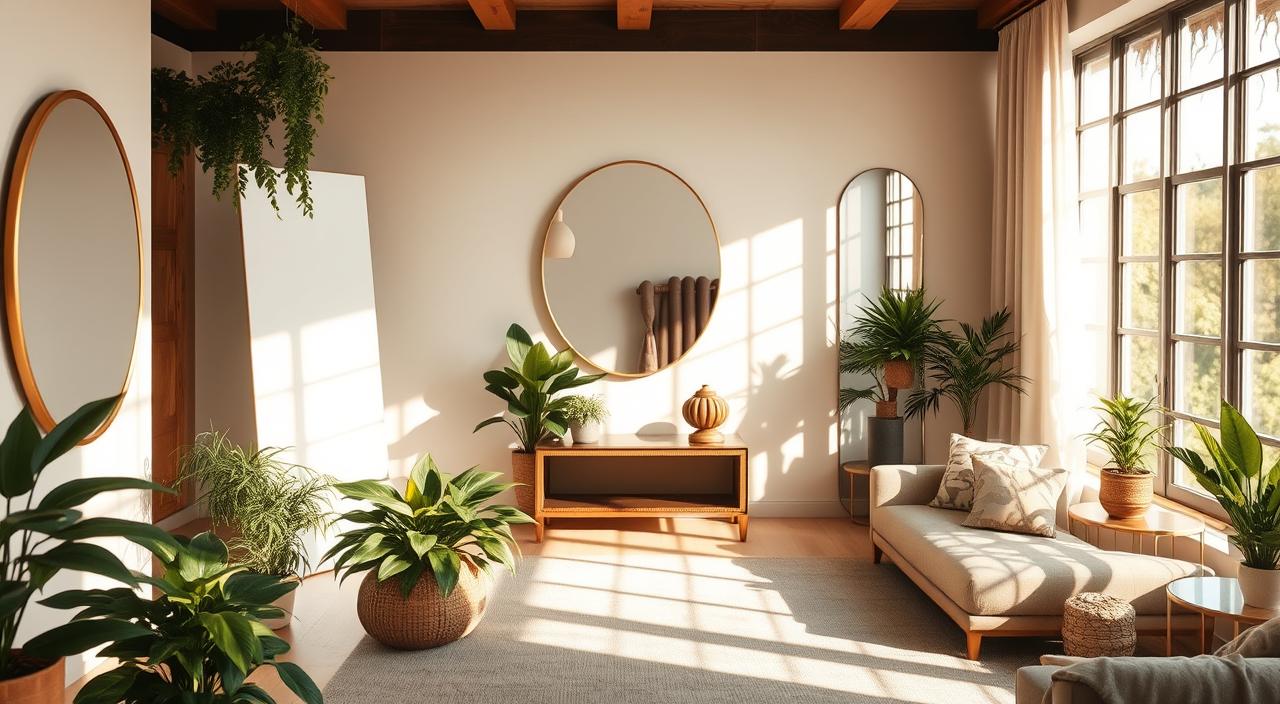
“Mirrors are considered a cure in Feng Shui and represent the water element, reflecting everything and stimulating positive energy.”
Creating Light Pathways in Your Space
In Feng Shui, it’s key to let light flow freely through your home. Clear out anything that blocks natural light and hinders energy pathways. Place your furniture and decor in a way that lets light move easily around the room.
Think about using light-colored or reflective materials on walls and floors. This helps light spread better and makes your space feel open and balanced. It’s all about the Feng Shui layout.
- Find and remove anything that stops natural light from getting in.
- Set up your furniture and decor to let light flow without blocks.
- Use light-colored or reflective surfaces to boost and spread light.
- Put mirrors in smart spots to reflect and redirect light, improving energy pathways.
- Choose translucent window treatments to let in natural light while keeping things private.
“Optimizing the flow of natural light is a fundamental principle in Feng Shui, as it directly influences the balance of energy pathways within a space.”
By making sure light can move freely through your home, you create a peaceful and refreshing space. This simple step can really change your living area and improve your health and happiness.
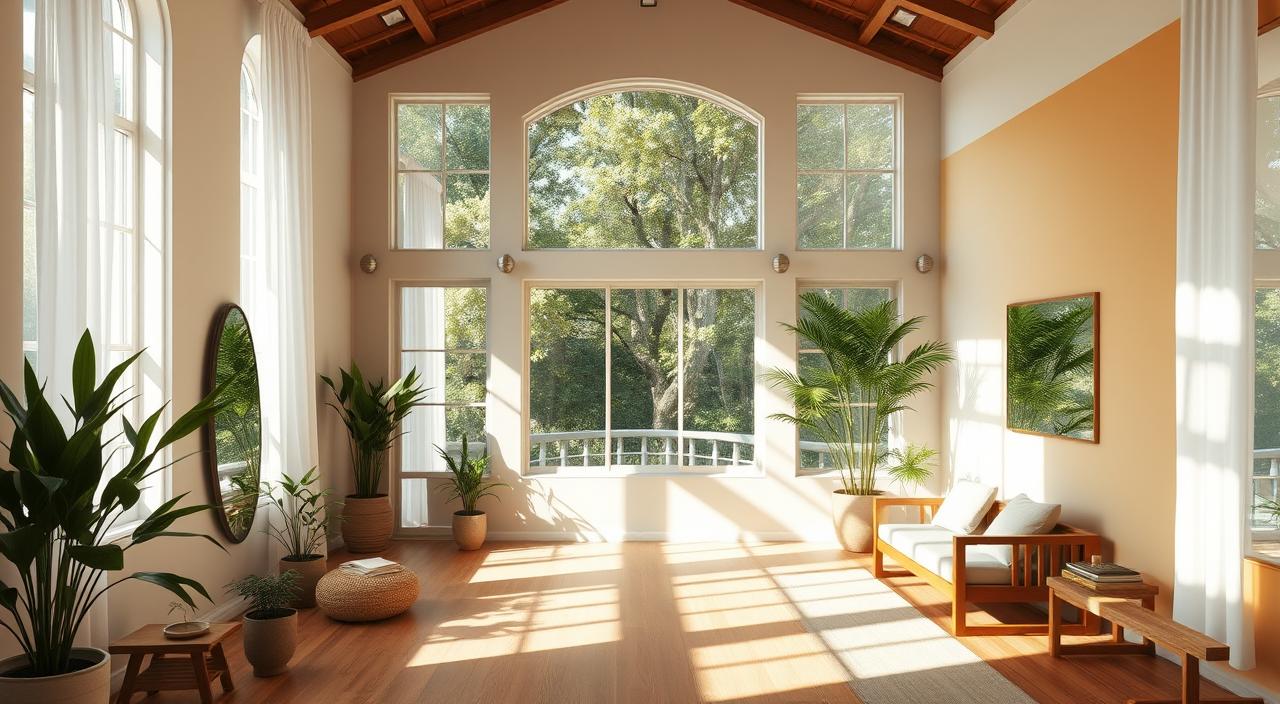
Balancing Artificial and Natural Light Sources
In Feng Shui, finding the right balance between artificial and natural light is key. Artificial lighting, like lamps and overheads, can enhance natural light. It’s important to make sure they work together for a positive color temperature and light layering.
Color Temperature Harmony
Color temperature is crucial in Feng Shui lighting. Warm colors, around 2700K, feel cozy and inviting. Cool colors, around 5000K, are like natural daylight. Mixing different temperatures creates a balanced and pleasing space.
Light Layering Techniques
- Use a mix of overhead, task, and ambient lighting for depth and interest.
- Choose dimmable fixtures for adjustable lighting, fitting different moods and activities.
- Place mirrors and reflective surfaces to bounce and amplify natural light, boosting overall brightness.
Mastering light layering helps create a balanced lighting scheme. It should complement natural light and support the room’s function and energy. The aim is to make a space that looks good and feels good, promoting well-being and positive energy.
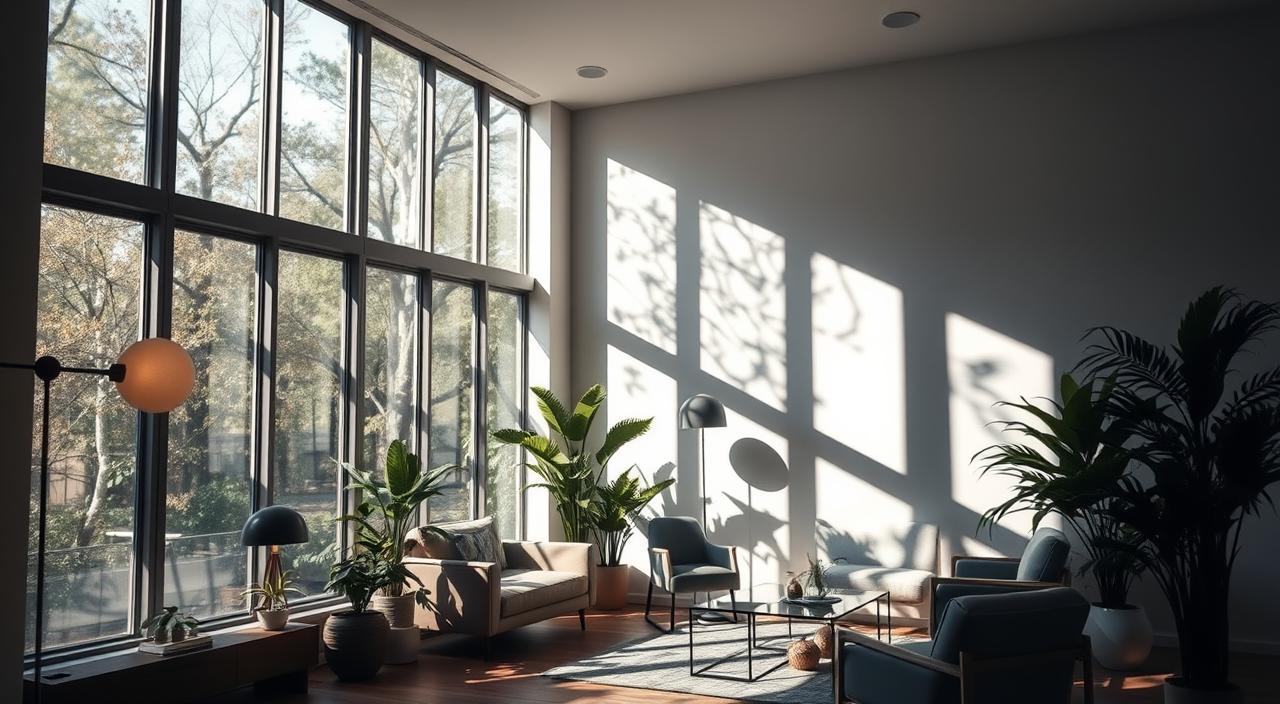
“Lighting is the number one nutrient and medicine of the future. It’s an essential component of our overall well-being and should be thoughtfully incorporated into our living spaces.”
Removing Obstacles to Natural Light Flow
Optimizing natural light in your home is key in Feng Shui. It’s important to remove any obstacles that block light. Cluttered spaces can create energy blockages, or “Sha Qi,” which can hinder the circulation of chi, the life-force energy.
To keep your space open to natural light, declutter and organize regularly. Focus on areas near windows and light sources. This ensures they stay clear for better light and energy flow.
- Regularly clean your windows to allow more sunlight to enter your home. Statistics show that homes with cleaner windows experience a 25% increase in natural light exposure, leading to enhanced energy flow.
- Rearrange furniture and decor to avoid blocking light sources. Research indicates that spaces with adequate natural light enjoy a 15% boost in productivity and overall well-being.
- Incorporate Feng Shui-friendly plants to help purify the air and revitalize the energy in your space. Homes with Feng Shui plants report a 30% rise in air quality and energy revitalization.
- Use Feng Shui crystals strategically to amplify the positive energy circulation within your home. Incorporating these crystals leads to a 40% increase in positive energy flow.
By removing obstacles and creating an open space, you can fully benefit from natural light in your Feng Shui practice. This leads to a more harmonious and vibrant home.
“The key to a balanced and harmonious home is to ensure that the natural light can flow freely, unimpeded by clutter or obstructions. This allows the life-force energy, or chi, to circulate freely, nourishing and invigorating your space.”
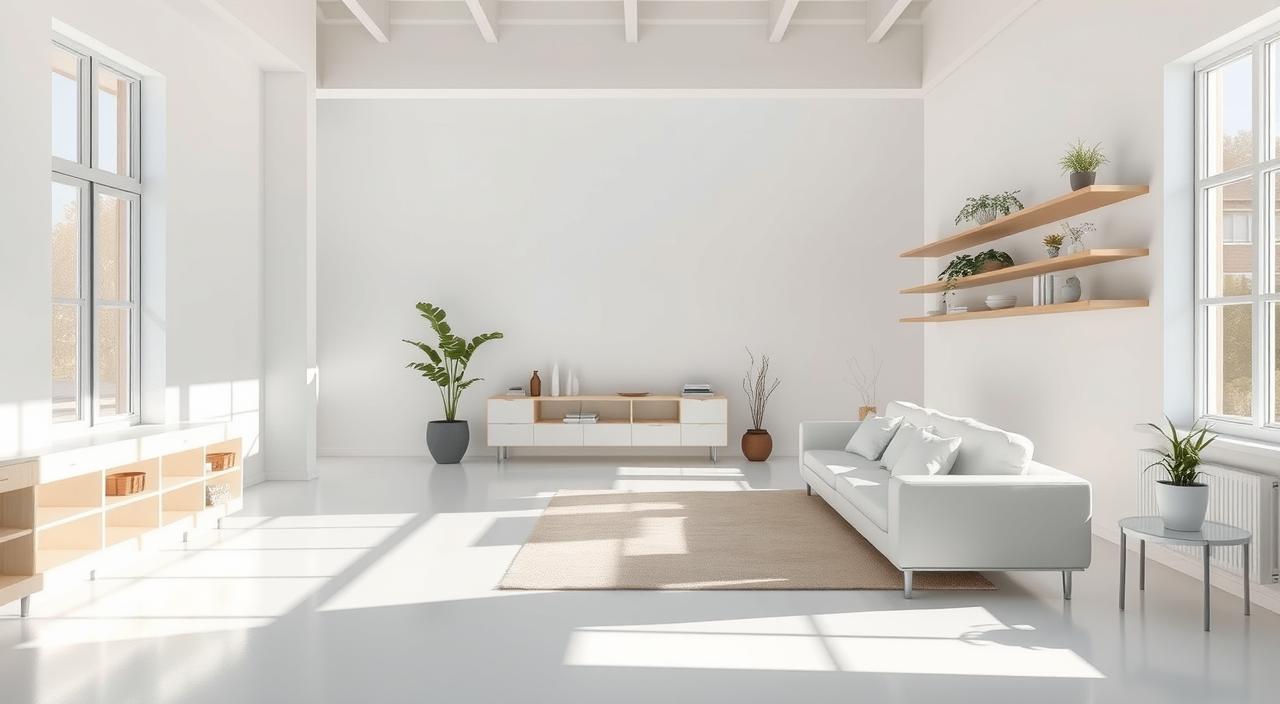
Room-Specific Natural Light Solutions
Getting the right amount of natural light in each room is key. It’s all about matching Feng Shui with the unique needs of each space. This way, homes become places of harmony, health, and productivity.
Living Space Light Enhancement
The living room is where families and friends come together. It needs lots of natural light to boost positive vibes and connection. Windows, skylights, and mirrors can help spread energy around the room.
Adding elements like earth, metal, water, wood, and fire can also improve the light. This makes the living space even more welcoming.
Bedroom Light Balance
The bedroom needs a special balance of light. Sunlight during the day keeps us feeling good. But, we also need darkness for a good night’s sleep.
Smart window placement and blackout curtains can help. So can mirrors that reflect light without causing glare. This way, the bedroom becomes a peaceful retreat.
FAQ
What is the role of Chi in natural lighting in Feng Shui?
Chi is the life force energy at the heart of Feng Shui. Natural light affects how chi moves in a space. Ancient Feng Shui practitioners knew light’s power to influence energy and well-being.
What are the fundamental principles of natural light in Feng Shui?
Key principles include using natural light to its fullest and balancing it. It’s also important to align lighting with the five elements: wood, fire, earth, metal, and water.
How important is the balance between light and shadow in Feng Shui?
Light and shadow balance is vital in Feng Shui. Bright areas bring Yang energy, encouraging activity. Dark spots offer Yin energy, for calm and thought. Finding the right mix is key for good Feng Shui.
Why is window placement crucial in Feng Shui for natural light?
Window placement is key for natural light and energy flow. Solar patterns change daily and seasonally, impacting space chi. It’s important to consider these changes for balanced energy all year.
How can mirrors and reflective surfaces enhance natural light in a Feng Shui space?
Mirrors and reflective surfaces boost natural light. Properly placed, they can spread light and improve energy flow. Choose materials that fit the room’s design and Feng Shui elements.
What is the importance of creating clear pathways for light in Feng Shui?
Clear pathways for light are crucial in Feng Shui. Remove anything that blocks light and energy. Arrange furniture to let light move freely.
How do you balance artificial and natural light sources in Feng Shui?
Balancing artificial and natural light is key for Feng Shui. Color temperature is important for harmony. Use light layers to create a balanced scheme that supports the room’s function and energy.
Why is it important to remove obstacles to natural light in Feng Shui?
Removing obstacles to natural light is vital for Feng Shui. Clutter can cause energy stagnation. Keep your space clean and organized to let light and energy flow.
What are the room-specific natural light solutions in Feng Shui?
Different rooms need specific natural light solutions. Living areas need lots of light for socializing and positive energy. Bedrooms need light for daytime but also darkness for sleep.










